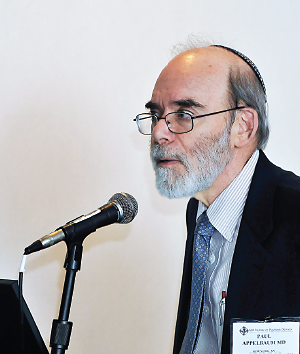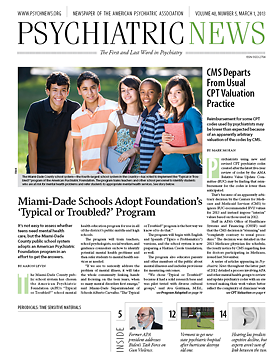Increased access to care for those with mental illness is unlikely to be a panacea for gun violence, according to a leading forensic psychiatrist testifying on behalf of APA before Vice President Joseph Biden’s Task Force on Gun Violence.
The alleged connection between mental illness and mass violence drew much attention as the task force, formed after the Newtown, Conn., school shootings last December, gathered its testimony. But the science indicates that the connection is quite tenuous.
“Substantial research shows that the vast majority of people with serious mental illness never act violently, and the vast majority of violent crimes—96 percent by the best available estimate—are not perpetrated by persons with mental disorders,” said former APA President Paul Appelbaum, M.D., now chair of APA’s Committee on Judicial Action.
“The expectation that fixing the mental health system will significantly reduce violence in the U.S. is unrealistic,” said Appelbaum, the Dollard Professor of Psychiatry, Medicine, and Law and director of the Division of Law, Ethics, and Psychiatry at Columbia University College of Physicians and Surgeons, in an interview with Psychiatric News. “If we think it will make us safer, then we’re chasing the wrong goal. We may have a better society, but it may not be a less-violent society.”
In his Capitol Hill testimony, Appelbaum suggested four strategies to address serious problems in the U.S. mental health system—appointing a presidential commission to develop a vision for a system of mental health care; creating a mechanism for facilitating responses to key mental health issues, such as designating a White House point person; improving early identification of youth with mental health problems; and developing “sensible, nondiscriminatory approaches” to ensuring that dangerous individuals cannot gain access to guns.
People with mental illness who are engaged in regular treatment are considerably less likely to commit violent acts than those who need, but don’t receive, appropriate mental health treatment, said Appelbaum. Despite this knowledge, funding for mental health services has been cut significantly in recent years. Public-sector appropriations alone have dropped by $4 billion over the last four years, he said.
Many people have suggested that early screening and treatment might avert the kind of recent school or college massacres that have been perpetrated by young adults. “It is good to find most disorders early, but they cannot be treated early without a system to which parents can turn, a system that is adequately funded and with adequate capacity,” Appelbaum stated.
He praised the inclusion of mental health coverage for young people up to age 26 in the Affordable Care Act, but also noted that the Obama administration has still not issued final regulations for implementation of the Mental Health Parity Act, enacted five years ago.
“That would finally do what we should have done all along,” he said.
Nevertheless, the Newtown tragedy has opened the door to a national discussion on an often dysfunctional mental health system. “What we have now is a nonsystem, one that is extremely difficult for people in need of care to negotiate,” Appelbaum told Psychiatric News. “There has been a selective focus on one aspect or another of the mental health system without recognizing that the system as a whole is broken.”
The last major rethinking of mental health care came with the 1963 Mental Health Act, he said. That legislation had a comprehensive vision, but it was never fully implemented and fell apart in the 1980s and 1990s.
In his testimony, Appelbaum reiterated APA’s interest in working with the Obama administration and Congress in efforts to improve public safety and access to and the quality of mental health services.
“A new initiative outlined by the President would provide training for school personnel and help ensure that young people who need help are referred to treatment,” said APA President Dilip Jeste, M.D., in a separate statement. “The administration has also proposed funding for state efforts to support young adults with mental health issues, to support school-based violence-prevention efforts, and to train 5,000 additional mental health professionals serving students and young adults. We strongly support these important steps.” ■

